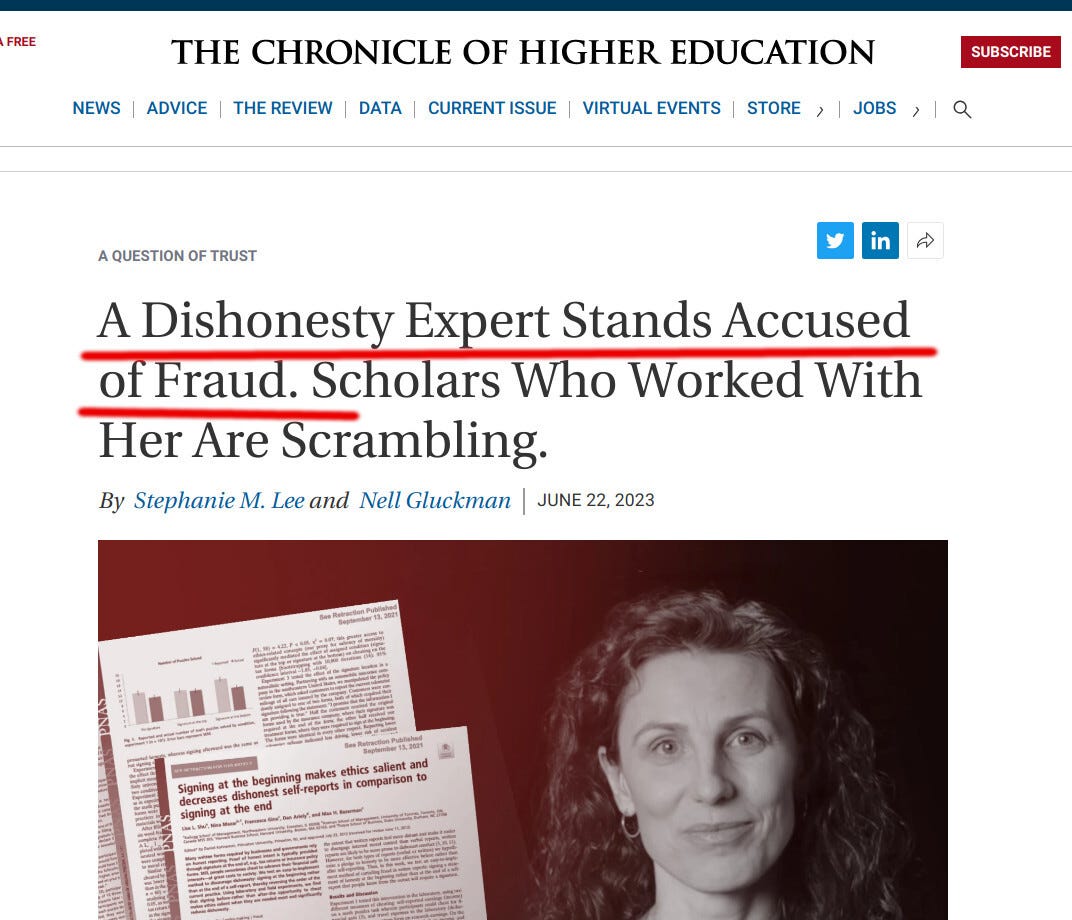Harvard Ethics Expert Caught Committing Academic Fraud
A Star Harvard Researcher Faked Research Findings
I am feeling a little under the weather right now, but I could not pass this up!
The field of modern “ethics research” is very special. In May, I wrote about Canadian ethicists recommending assisted suicide for the desperately poor. Last November, I described ethicists’ proposals to surreptitiously administer psychoactive substances to people to achieve “collective welfarism.”
It turns out that the woke ethics field has more stories for us!

A rising Harvard University Business School star Francesca Gino authored numerous groundbreaking research studies. Her explorations centered around honesty and how to make people more honest.
Prof. Gino’s LinkedIn page proudly talks about culture and leadership.
The problem is that the studies that gave her fame and authority were fake, as The Chronicle explains:
Gino is on administrative leave from Harvard amid allegations that research she co-authored contains fabricated data, as The Chronicle reported last Friday. The next day, a trio of academics wrote on their blog that they’d found “evidence of fraud” in four of her papers, which they said Harvard was seeking to have retracted. But “we believe that many more Gino-authored papers contain fake data,” they added, without specifying. “Perhaps dozens.”
This “dishonesty researcher” could not resist the temptation to be dishonest in her studies. She was eventually caught.
“Two different people independently faked data for two different studies in a paper about dishonesty,” wrote the trio of academics known collectively as Data Colada: Joseph Simmons of the University of Pennsylvania; Uri Simonsohn of the Esade Business School, in Spain; and Leif Nelson of the University of California at Berkeley.
Her “research in ethics and honesty” landed her very nicely paying consulting gigs from numerous large woke firms such as Disney and Google:
Gino’s dozens of papers about ethical leadership and workplace behavior, done with other scholars at elite business schools, led to countless speaking and consulting gigs with Fortune 500 corporations, from Disney to Google. That work also informed her 2018 book, Rebel Talent: Why It Pays to Break the Rules at Work and in Life. Along the way, though, were hints that the foundational research may have been shaky.
The good news is that Francesca was eventually caught.
In having been caught, she follows the path of a fake “criminology researcher” who fraudulently “proved” the existence of “punitive racism” allegedly prevalent in the hearts of white people.
(Credit goes to @Jikkyleaks on Twitter for sharing the link about Francesca)
Before I conclude this post, I must say that many people lie from time to time. I am not unyieldingly 100% honest in my daily dealings. For instance, when trying to buy a beautiful vase at a garage sale, I might lie and say that it is junky and I do not care about it while secretly wanting badly to get it. (This is my confession - roast me all you want)
Are you surprised that a Harvard “ethics researcher” is academically dishonest?
Is there a difference between “small lies” and “big lies”? Do you know anyone who is always completely honest?
Voice your opinion please!



She should apply for a job with the CDC. She is very qualified.
My dad—who was a prolific liar—told me “never trust anyone who tells you how honest they are.” Expert advice.